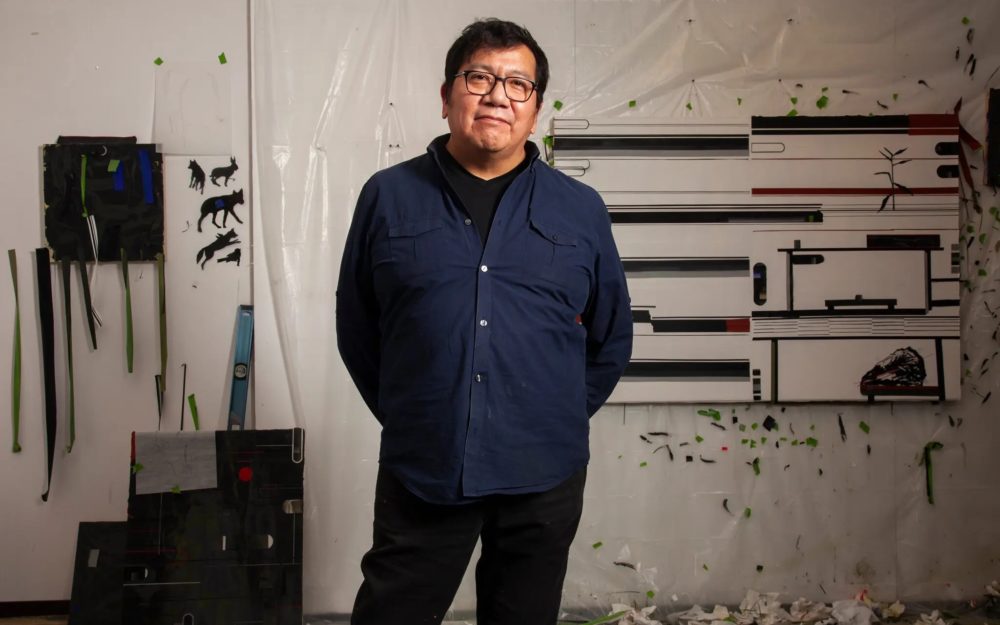- We’re open today from 10 am to 5 pm
- Purchase tickets
- Join mailing list
- Join as a member
- Donate

Duane Slick: The Coyote Makes the Sunset Better
Over a career spanning thirty years, painter Duane Slick has consistently pursued a vision to integrate secular Modernist abstraction with the beliefs and traditions of his Native American heritage. Duane Slick: The Coyote Makes the Sunset Better will be the artist’s first solo museum exhibition, bringing together over 90 paintings, prints, photographs, and video, all made within the last five years. The selected works include the artist’s ongoing series that reference the coyote as a seminal figure in indigenous culture, as well as paintings that reflect both the landscape of Slick’s upbringing in Iowa and the symbology and beliefs of his heritage as a citizen of both the Meskwaki (Fox of Iowa) and Ho-Chunk (Nebraska) Nations.
Artworks
Installation Images
As a child Slick was told by his parents to be circumspect when speaking of his culture to others, as European civilization had taken so much from Native peoples since its conquest of the Americas. Slick found a way around this injunction: he could speak of his background through pictures and the natural ambiguity that comes with image-making. This way of working has potently informed the artist’s practice, not acting as a detriment, but rather as an advantage, allowing Slick to communicate in a language that is nuanced and as complex as his subject matter.
The visage of the coyote in the artist’s work is derived from a handful of folk-art coyote masks that the artist acquired in Guanajuato, Mexico. The mask is used to define and reinforce architypes in traditional cultures, and Slick’s projection of the coyote’s persona through the mask amplifies the role that the animal has played in the mythology and folklore of indigenous people throughout North America. No other figure is as central to Native American story telling as the coyote, with the animal functioning as both a demi-god and a trickster, simultaneously embodying wisdom and foolishness. In Slick’s work, the image of the coyote is constantly shape- shifting, reveling in the creature’s infinitely mutable character, one that is often considered a being without a physical body.
In larger paintings, Slick combines total abstraction with veiled representation. Both the Meskwaki and Ho-Chunk are woodland tribes, and the artist’s color sensibly reflects the muted tones of their ancestral homelands. Meskwaki translates into “people of the red earth,” and Slick’s subdued palette is frequently enlivened by red pictorial elements. Frequent appearances of ghostly silhouettes of grasses and other plants in Slick’s work also speak directly to the Iowa landscape that informed his upbringing. The horizontal striped format favored by the artist grew out of paintings that featured American flags, a series Slick began after the death of his father, who served in the U.S. military during the Korean War.
The exhibition will feature over 90 works, including a new experimental video projection made in collaboration with the artist Martin Smick. Growing out of a project by Slick and Smick in 2018 at the Haffenreffer Museum of Anthropology at Brown University, the video is based on 3-D scans of coyote masks in Slick’s collection.
Duane Slick: The Coyote Makes the Sunset Better is curated by Richard Klein, Exhibitions Director, and will be accompanied by a eighty-page catalogue, the first major publication of the artist’s work.
Duane Slick (b. 1961, Waterloo, IA) has exhibited widely, including Albert Merola Gallery, Provincetown, MA; University of Northern Iowa, Cedar Falls; Bannister Gallery, Rhode Island College, Providence, RI; Neilson Gallery, Boston, MA; Gregory Lind Gallery, San Francisco, CA; and Jan Cicero Gallery, Chicago, IL. He has received numerous grants and fellowships, including an Eiteljorg Fellowship for Native American Art; a Fellowship at the School for Advanced Research, Santa Fe, NM; a Joan Mitchell Foundation Grant; a Rockefeller Foundation Grant; and a Robert Motherwell Fellowship at the Fine Arts Work Center, Provincetown, MA. His work is the collections of The National Museum of the American Indian, Smithsonian Institution, Washington, D.C.; DeCordova Sculpture Garden and Museum, Lincoln, MA; the Milwaukee Art Museum, Milwaukee, WI; and the C.N. Gorman Museum, University of California, Davis. Since 1995 he has been Professor of Painting and Printmaking at the Rhode Island School of Design, Providence, RI. Slick received a BFA from the University of Northern Iowa, Cedar Falls, Cedar Falls, IA and an MFA from the University of California-Davis, Davis, CA.
Links
Press
Funders
Major support for Duane Slick: The Coyote Makes the Sunset Better is provided by The Andy Warhol Foundation for the Visual Arts, The Aldrich Council, and the Artist's Resource Trust. The catalogue for Duane Slick: The Coyote Makes the Sunset Better is generously supported by the Eric Diefenbach and James-Keith Brown Publications Fund and the RISD Professional Development Fund. Preferred Art Logistics Provider: Crozier Fine Arts.

Related Exhibitions
Related News
At the Aldrich Museum, the Coyote Takes the Lead, The New York Times
Duane Slick deploys his canine friend in a thrilling show. For the 60-year-old artist and professor, this first museum solo is long overdue.
Top image: Duane Slick, There Are No Endings, 2018. Courtesy of the artist













